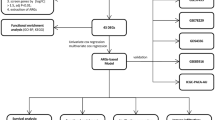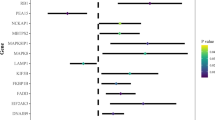Abstract
Autophagy affects the development, progression, and prognosis of various cancers including pancreatic cancer. To develop an autophagy-related prognostic model of pancreatic cancer, we systematically analyzed gene expression profile from The Cancer Genome Atlas and Genotype-Tissue Expression. Ten autophagy-relevant genes with potential prognostic values were identified, based on which a prognostic model was constructed. We divided patients into a high- and a low-risk group with this model. Time-dependent receiver operating characteristic and Kaplan–Meier curves were conducted to evaluate the accuracy of the model. The Area Under Curvevalues of this model at 12, 18, and 24 months were 0.76, 0.73, and 0.78, respectively. The model was further validated in two Gene Expression Omnibus datasets. Gene set enrichment analysis and Cibersort were applied to analyze immune infiltration patterns and immune checkpoint blockade (ICB) molecules. The expression of ICB molecules, such as PD-L1 and PD1, presented significant correlation with the risk score. In conclusion, the risk score model established herein has been proved to be robust for evaluating the prognosis of pancreatic cancer and facilitate to improve the efficacy of ICB.









Similar content being viewed by others
References
Amaravadi R, Kimmelman AC and White E 2016 Recent insights into the function of autophagy in cancer. Genes Dev. 30 1913–1930
Ashburner M, Ball CA, Blake JA, et al. 2000 Gene ontology: tool for the unification of biology. The gene ontology consortium. Nat. Genet. 25 25–29
Ashour AA, Gurbuz N, Alpay SN, Abdel-Aziz AA, Mansour AM, Huo L and Ozpolat B 2014 Elongation factor-2 kinase regulates TG2/β1 integrin/Src/uPAR pathway and epithelial-mesenchymal transition mediating pancreatic cancer cells invasion. J. Cell Mol. Med. 18 2235–2251
Balachandran VP, Łuksza M, Zhao JN, et al. 2017 Identification of unique neoantigen qualities in long-term survivors of pancreatic cancer. Nature 551 512–516
Boyiadzis MM, Kirkwood JM, Marshall JL, Pritchard CC, Azad NS and Gulley JL 2018 Significance and implications of FDA approval of pembrolizumab for biomarker-defined disease. J. Immunother. Cancer 6 35
Castino GF, Cortese N, Capretti G, et al. 2016 Spatial distribution of B cells predicts prognosis in human pancreatic adenocarcinoma. Oncoimmunology 5 e1085147
Considine B and Hurwitz ME 2019 Current status and future directions of immunotherapy in renal cell carcinoma. Curr. Oncol. Rep. 21 34
Ding L, Han L, Li Y, Zhao J, He P and Zhang W 2014 Neurogenin 3-directed cre deletion of Tsc1 gene causes pancreatic acinar carcinoma. Neoplasia 16 909–917
Flaks B, Moore MA and Flaks A 1981 Ultrastructural analysis of pancreatic carcinogenesis. IV. Pseudoductular transformation of acini in the hamster pancreas during N-nitroso-bis (2-hydroxypropyl)amine carcinogenesis. Carcinogenesis 2 1241–1253
Gatica D, Lahiri V and Klionsky DJ 2018 Cargo recognition and degradation by selective autophagy. Nat. Cell Biol. 20 233–242
Hu D, Jiang L, Luo S, Zhao X, Hu H, Zhao G and Tang W 2020 Development of an autophagy-related gene expression signature for prognosis prediction in prostate cancer patients. J. Transl. Med. 18 160
Huang F, Chen W, Peng J, Li Y, Zhuang Y, Zhu Z, Shao C, Yang W, Yao H and Zhang S 2018 LncRNA PVT1 triggers Cyto-protective autophagy and promotes pancreatic ductal adenocarcinoma development via the miR-20a-5p/ULK1 Axis. Mol. Cancer 17 98
Jiao Y, Li Y, Liu S, Chen Q and Liu Y 2019 ITGA3 serves as a diagnostic and prognostic biomarker for pancreatic cancer. Oncol. Targets Ther. 12 4141–4152
Kadaba R, Birke H, Wang J, et al. 2013 Imbalance of desmoplastic stromal cell numbers drives aggressive cancer processes. J Pathol. 230 107–117
Kanehisa M and Goto S 2000 KEGG: kyoto encyclopedia of genes and genomes. Nucleic Acids Res. 28 27–30
Kikuta K, Masamune A, Watanabe T, Ariga H, Itoh H, Hamada S, Satoh K, Egawa S, Unno M and Shimosegawa T 2010 Pancreatic stellate cells promote epithelial-mesenchymal transition in pancreatic cancer cells. Biochem. Biophys. Res. Commun. 403 380–384
Kim Y, Kim YS, Kim DE, et al. 2013 BIX-01294 induces autophagy-associated cell death via EHMT2/G9a dysfunction and intracellular reactive oxygen species production. Autophagy 9 2126–2139
Komatsubara KM and Carvajal RD 2017 Immunotherapy for the treatment of uveal melanoma: current status and emerging therapies. Curr. Oncol. Rep. 19 45
Koustas E, Sarantis P, Kyriakopoulou G, Papavassiliou AG and Karamouzis MV 2019 The interplay of autophagy and tumor microenvironment in colorectal cancer-ways of enhancing immunotherapy action. Cancers 11 533
Li FH, Xiang L, Ran L, Zhou S, Huang Z, Chen M and Yu WF 2019 BNIP1 inhibits cell proliferation, migration and invasion, and promotes apoptosis by mTOR in cervical cancer cells. Eur. Rev. Med. Pharmacol. Sci. 23 1397–1407
Liu Q, Liao Q and Zhao Y 2017 Chemotherapy and tumor microenvironment of pancreatic cancer. Cancer Cell Int. 17 68
Liu SH, Hong Y, Markowiak S, et al. 2019 BIRC5 is a target for molecular imaging and detection of human pancreatic cancer. Cancer Lett. 457 10–19
Mahmoud SM, Lee AH, Paish EC, Macmillan RD, Ellis IO and Green AR 2012 The prognostic significance of B lymphocytes in invasive carcinoma of the breast. Breast Cancer Res. Treat. 132 545–553
Mallela K and Kumar A 2021 Role of TSC1 in physiology and diseases. Mol. Cell Biochem. 476 2269–2282
Mele L, Del VV, Liccardo D, et al. 2020 The role of autophagy in resistance to targeted therapies. Cancer Treat. Rev. 88 102043
Mizushima N and Komatsu M 2011 Autophagy: renovation of cells and tissues. Cell 147 728–741
Neill T, Chen CG, Buraschi S and Iozzo RV 2020 Catabolic degradation of endothelial VEGFA via autophagy. J. Biol. Chem. 295 6064–6079
Newman AM, Liu CL, Green MR, Gentles AJ, Feng W, Xu Y, Hoang CD, Diehn M and Alizadeh AA 2015 Robust enumeration of cell subsets from tissue expression profiles. Nat. Methods 12 453–457
Nielsen MF, Mortensen MB and Detlefsen S 2016 Key players in pancreatic cancer-stroma interaction: Cancer-associated fibroblasts, endothelial and inflammatory cells. World J. Gastroenterol. 22 2678–2700
Oji Y, Tatsumi N, Fukuda M, et al. 2014 The translation elongation factor eEF2 is a novel tumor-associated antigen overexpressed in various types of cancers. Int. J. Oncol. 44 1461–1469
Orth M, Metzger P, Gerum S, Mayerle J, Schneider G, Belka C, Schnurr M and Lauber K 2019 Pancreatic ductal adenocarcinoma: biological hallmarks, current status, and future perspectives of combined modality treatment approaches. Radiat. Oncol. 14 141
Papoff G, Presutti D, Lalli C, Bolasco G, Santini S, Manelfi C, Fustaino V, Alemà S and Ruberti G 2018 CASP4 gene silencing in epithelial cancer cells leads to impairment of cell migration, cell-matrix adhesion and tissue invasion. Sci. Rep. 8 17705
Postow MA, Callahan MK and Wolchok JD 2015 Immune checkpoint blockade in cancer therapy. J. Clin. Oncol. 33 1974–1982
Pu N, Zhao G, Gao S, Cui Y, Xu Y, Lv Y, Nuerxiati A and Wu W 2018 Neutralizing TGF-β promotes anti-tumor immunity of dendritic cells against pancreatic cancer by regulating T lymphocytes. Cent. Eur. J. Immunol. 43 123–131
Pulluri B, Kumar A, Shaheen M, Jeter J and Sundararajan S 2017 Tumor microenvironment changes leading to resistance of immune checkpoint inhibitors in metastatic melanoma and strategies to overcome resistance. Pharmacol. Res. 123 95–102
Qin S, Xu L, Yi M, Yu S, Wu K and Luo S 2019 Novel immune checkpoint targets: moving beyond PD-1 and CTLA-4. Mol. Cancer 18 155
Rahib L, Smith BD, Aizenberg R, Rosenzweig AB, Fleshman JM and Matrisian LM 2014 Projecting cancer incidence and deaths to 2030: the unexpected burden of thyroid, liver, and pancreas cancers in the United States. Cancer Res. 74 2913–2921
Rangwala R, Chang YC, Hu J, et al. 2014 Combined MTOR and autophagy inhibition: phase I trial of hydroxychloroquine and temsirolimus in patients with advanced solid tumors and melanoma. Autophagy 10 1391–1402
Rawla P, Sunkara T and Gaduputi V 2019 Epidemiology of pancreatic cancer: global trends, etiology and risk factors. World J. Oncol. 10 10–27
Ribas A and Wolchok JD 2018 Cancer immunotherapy using checkpoint blockade. Science 359 1350–1355
Ritchie ME, Phipson B, Wu D, Hu Y, Law CW, Shi W and Smyth GK 2015 limma powers differential expression analyses for RNA-sequencing and microarray studies. Nucleic Acids Res.43 e47
Schaaf MB, Houbaert D, Meçe O and Agostinis P 2019 Autophagy in endothelial cells and tumor angiogenesis. Cell Death Differ. 26 665–679
Shchors K, Massaras A and Hanahan D 2015 Dual Targeting of the autophagic regulatory circuitry in gliomas with repurposed drugs elicits cell-lethal autophagy and therapeutic benefit. Cancer Cell. 28 456–471
Shi J, Zhao Y, Wang Y, Gao W, Ding J, Li P, Hu L and Shao F 2014 Inflammatory caspases are innate immune receptors for intracellular LPS. Nature 514 187–192
Subramanian A, Tamayo P, Mootha VK, et al. 2005 Gene set enrichment analysis: a knowledge-based approach for interpreting genome-wide expression profiles. Proc. Natl. Acad. Sci. USA 102 15545–15550
Tamborero D, Rubio-Perez C, Muiños F, Sabarinathan R, Piulats JM, Muntasell A, Dienstmann R, Lopez-Bigas N and Gonzalez-Perez A 2018 A pan-cancer landscape of interactions between solid tumors and infiltrating immune cell populations. Clin. Cancer Res. 24 3717–3728
Uhlén M, Fagerberg L, Hallström BM, et al. 2015 Proteomics. Tissue-based map of the human proteome. Science 347 1260419
Wang WQ, Liu L, Xu HX, Wu CT, Xiang JF, Xu J, Liu C, Long J, Ni QX and Yu XJ 2016 Infiltrating immune cells and gene mutations in pancreatic ductal adenocarcinoma. Br. J. Surg. 103 1189–1199
Yamamoto K, Venida A, Perera RM and Kimmelman AC 2020a Selective autophagy of MHC-I promotes immune evasion of pancreatic cancer. Autophagy 16 1524–1525
Yamamoto K, Venida A, Yano J, et al. 2020b Autophagy promotes immune evasion of pancreatic cancer by degrading MHC-I. Nature 581 100–105
Yang A, Rajeshkumar NV, Wang X, et al. 2014 Autophagy is critical for pancreatic tumor growth and progression in tumors with p53 alterations. Cancer Discov. 4 905–913
Yang A, Herter-Sprie G, Zhang H, et al. 2018 Autophagy sustains pancreatic cancer growth through both cell-autonomous and nonautonomous mechanisms. Cancer Discov. 8 276–287
Yang S, Wang X, Contino G, et al. 2011 Pancreatic cancers require autophagy for tumor growth. Genes Dev. 25 717–729
Yang S, Imamura Y, Jenkins RW, et al. 2016 Autophagy inhibition dysregulates tbk1 signaling and promotes pancreatic inflammation. Cancer Immunol. Res. 4 520–530
Zhai L, Ladomersky E, Lenzen A, Nguyen B, Patel R, Lauing KL, Wu M and Wainwright DA 2018 IDO1 in cancer: a Gemini of immune checkpoints. Cell Mol. Immunol. 15 447–457
Acknowledgements
We thank the HADB (http://autophagy.lu/clustering/index.html), UCSC Xena (http://xena.ucsc.edu/), GTEx (https://www.gtexportal.org/), TCGA (https://portal.gdc.cancer.gov/), GEO (https://www.ncbi.nlm.nih.gov/geo/) and HPA (https://www.proteinatlas.org/) for sharing the large amount of data.
Author information
Authors and Affiliations
Corresponding authors
Additional information
Corresponding editor: Sagar Sengupta
Corresponding editor: Sagar Sengupta
Supplementary Information
Below is the link to the electronic supplementary material.
Rights and permissions
About this article
Cite this article
Jiang, P.C., Bao, T.Y., Zhi, J.M. et al. Prognostic value and immunological characteristics of a novel autophagy-related signature in pancreatic cancer. J Biosci 46, 68 (2021). https://doi.org/10.1007/s12038-021-00189-9
Received:
Accepted:
Published:
DOI: https://doi.org/10.1007/s12038-021-00189-9




